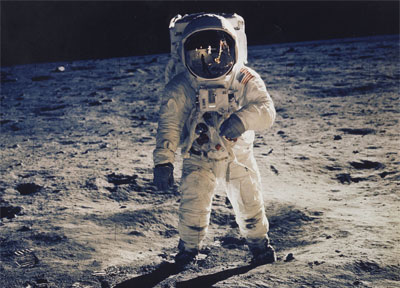Apollo’s greatest achievementby S. Alan Stern
|
| As I see it, the greatest achievement of Apollo is the inspiration that Apollo’s bold, quickly-paced, and futuristic accomplishment generated in so many baby boomers. |
Now, looking back as we celebrate that singularly human, and singularly historic achievement—journeying to and walking on another world—we know that the 2009 I imagined as a boy is oh so different from the real 2009 we live in. It’s so different, in fact, that people even wonder if Apollo was worth the cost, and if it was more than a historical footnote—an odd bit of the distant future that took early but only short-lived root in the middle of the 20th century.
So today, as we take stock of Apollo 40 years later, is a good time to ask what each of us thinks the greatest impact of the $100+ billion Apollo project really was.
The long ballyhooed achievements of Apollo are many. There is the Cold War propaganda victory that came with wave after wave of international accolades for America. There is the internal boost that Apollo’s success provided at a time when assassinations, race riots, student strife, and an unpopular war were the norm. There is the transformative awareness of the Earth as a finite planetary oasis in the vast and hostile ocean of space. They also include scientific discoveries that revolutionized our understanding of the origin of the Moon, the evolution of planetary crusts, and chronology of our home solar system. And they include revolutionary advances in electronics technology that fueled revolutions in telecommunications and computing that have transformed how we live and work. Each of these achievements has been cited as being worthy of Apollo’s cost.
But in my view, the greatest achievement of Apollo is something more important, something that took decades to be recognized, and which is only now coming into focus.
As I see it, the greatest achievement of Apollo is the inspiration that Apollo’s bold, quickly-paced, and futuristic accomplishment generated in so many baby boomers, whose hearts were captured by the tsunami of new technologies Apollo generated and the sheer exuberance for invention that space exploration inspired.
As a result, armies of kids like myself followed their hearts, stirred by the epic, larger-than-life explorations of Apollo that unfolded before them on TVs, and chose careers in computer science, electrical engineering, aerospace engineering, geophysics, and a dozen other technical fields. The children and adolescents whose hearts were stirred and minds were captured by Apollo’s inspiration number in the millions, and include names then like Paul Allen, Jeff Bezos, Sergey Brin, John Carmack, Bill Gates, Steve Jobs, and Elon Musk, all captains of the computing and Internet revolutions.
| Indeed, perhaps in another 10 years, the second greatest achievement of Apollo will be seen as the space access revolution that baby boomer tech billionaires are now giving birth to. |
When these and others of Apollo’s children entered the workforce, we thoroughly transformed our economy and lives in ways virtually no one could have imagined 40 years ago. We did so by sparking a bevy of tech revolutions that showered society with inventions, productivity increases, and new ways of socializing across the ’80s, ’90s, and this decade too. This—a trillion-dollar dividend for a $100+ billion investment—is truly Apollo’s best achievement, its best spinoff.
And this very special dividend continues to generate good return even today. Some of the most successful “children of Apollo” are now returning to their space roots, investing their time and their fortunes to open up space exploration in wholly new and imaginative ways with private companies like Armadillo Aerospace, Blue Origin, SpaceX, and Virgin Galactic. Indeed, perhaps in another 10 years, the second greatest achievement of Apollo will be seen as the space access revolution that baby boomer tech billionaires are now giving birth to. But I digress.
President Obama’s administration is now taking up the reins of our national space program and choosing its forward course. As this young and innovative administration shapes America’s civil space program, I hope they will fashion a bold, innovative, and quickly paced 21st century effort of equally stirring nature to Apollo. For if they do, they can expect its cost to be repaid many times over, as Apollo’s was, by the children and teens inspired to take up technical fields, fueling our economy, and revolutionizing life for the better, across the next 40 years.
